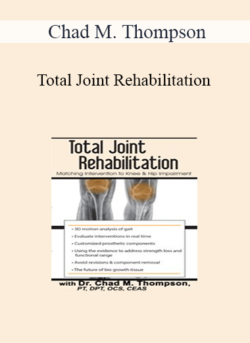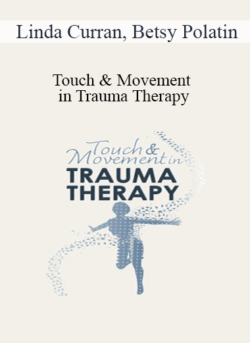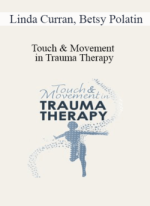[Instant Download] – Immediately deliver the download link after receiving the paymentPurchase Linda Curran, Betsy Polatin – Touch & Movement in Trauma Therapy courses at here with PRICE $219.99 $41Faculty:Linda Curran | Betsy PolatinDuration:7 Hours 59 MinutesFormat:Audio and VideoCopyright:Jul 12, 2018 Manual – Touch & Movement in Trauma Therapy (3.5 MB) 27 Pages Available after Purchase OutlineIntroduction to Betsy Polatin & Performance TrainingDo Our Intentions Match the Results?Entrenched PatternsPerformance & TraumaSomatic ExperiencingAllowing Our Bodies to Complete a ResponseUnderstanding Our PatternsLetting Go of a “Character”The Actor’s Secret: A New Approach to Performance TrainingThe Alexander TechniqueThe Importance of SupportBreathing Coordination3 Dimensional BreathingSomatic ExperiencingThe Importance of Movement How Do We “Use” Ourselves Effort & EnergyCan You Do Less?Toned But Not TenseClient DemonstrationTouch & MovementThe Roles We PlayChanging Habitual Patterns through Touch & MovementResourcingInternal ResourcesExternal ResourcesExperiential Exercise: “Resources” & DiscussionTrauma 101“What Happened to You” vs. “What is Wrong With You”Peter Levine’s View of TraumaThe Brain in the Palm of Your Hand (Dan Siegel)Interpersonal NeurobiologyOverwhelm/Shutting DownGestalt TherapyThe Arousal CycleExperiential Exercise: “Startle Exercise” Reset BreathOrienting: Betsy PolatinLiving in the Present vs. the PastExperiential Exercise: “Orienting”Orienting DemonstrationDifferentiatingThe Autonomic Nervous System: Linda CurranStephen Porges: Polyvagal TheoryTend/BefriendFight/Fright/FreezeCollapse (Dorsal Vagal Response)The Levels of Physiological ArousalExperiential Exercise: “Tracking”Reptilian Brain (Sensations)Limbic (Feelings)Cognitive (Thinking)Containment & SupportTracking DemonstrationStress ResponseStress Event/ReactionDischarge EnergyEquilibrium/BaselineFreeze ResponseSympathetic vs. ParasympatheticDefense CascadeTonic ImmobilityRobert Scaer M.D. InterviewRegulationInterpersonal RegulationSelf-RegulationExperiential Exercise: Interoceptors & DiscussionUse of Self“How” vs. “What” You DoDefinition of “Use”Two ConceptsSupport SuspensionDemonstration: “Support”Wrap Up & ConclusionAwareness through Movement Feldenkrais MethodHands on MethodAwareness through Movement LessonsHuman Brains Organized Towards Efficiency, Healing, and Functional OrganizationTrauma & Awareness through Movement Shift Self-Awareness in the BodyEffect on Nervous SystemExperiential ExerciseTouch “When & Why” Harry Harlow StudyNeglect & AttachmentImportance of TouchTouch & ResonanceAsking Permission Before TouchingExperiential Exercise: “Energetic Boundaries” & Discussion Two Types of TouchPractitioner Hands on “to fix”Non-Fixing Touch3 Ways of Approaching TouchMerging TouchBarely TouchingAgency TouchExperiential Exercise: “Hands On” & DiscussionTouch & Trauma TreatmentSupportCommunication about TouchExperiential Exercise: “Get a Pen” & Ethical Decision Making Worksheet & ExplanationHow to Communicate When We Don’t Want to be TouchedHow Essential Touch is to Our Well-BeingSkin HungerBoundariesLetters to Body Workers Regarding TouchSuspensionSuspended From AboveTwo SystemsCompression System (Building Blocks)Suspension System (Expansion)Body Alignment: Suspension SystemTensegrityExperiential Exercise: “Suspension” & DiscussionGroundingIntroductionReview of Ethical Decision-Making WorksheetFollow-up: Letter to Body WorkersWorking with FlashbacksGuided Imagery is the Opposite of FlashbacksExperiential Exercise: Guided Imagery: “Lemon Experiment” & DiscussionBreathingReview of Suspension & SupportCarl Stough “Breathing Coordination”Proper Breathing Requires AttentionBreathing Coordination Used to Reverse EmphysemaDifferent Models of BreathingDiaphragm BreathingBelly Breathing3 Dimensional BreathingSidewaysUp & DownFront to BackExperiential Exercise: “3 Dimensional Breathing” & DiscussionCollapsed vs. Empowered StanceExperiential Exercise: “Collapsed vs. Empowered Stance”Dual AwarenessHelping Clients be Aware of their StanceHelping Clients be Aware of their EmotionsAutonomic Nervous SystemVolitional ControlDissociationGoal: Become Embodied & PresentMentor: Mary Lou Schack, Ph.D.Problems Have a Traumatic BaseExperiential Psychotherapy Session with Dr. SchackProcessing the SessionFour Reactions to TraumaFightFlightFreezeFind a Friend (Basic Human Instinct)We’re Traumatized Because We Don’t Believe we Can Get HelpAwareness & Alexander Technique: Betsy PolatinExperiential Exercise: “50/50 Awareness” 50% Awareness in on the Inside50% Awareness in on the Outside Experiential Exercise: “The Chair” with Betsy PolatinAlexander TechniqueExperiential Exercise: “Can I Do Less?” & DiscussionKnowing our Own PatternsBeing Able to Shift Your PatternsEmbodied Self: Linda CurranMore about Betsy Polatin’s BackgroundDanceVocal CoachMovement, Trauma & ExperienceWorking with Peter LevineWrap Up & ConclusionRelationships before TouchThe Language of Trauma is SensorFaculty Linda Curran, BCPC, LPC, CACD, CCDPD Related seminars and products: 14 Linda A. Curran, BCPC, LPC, CACD, CCDPD, EMDR Level II Trained, is president of Integrative Trauma Treatment, LLC in Havertown, PA. She provides clients an integrative approach to trauma, and treats PTSD in adolescent and adult populations, including clients with eating disorders, sexual trauma, and self-injury. An international speaker on the treatment of trauma, Linda has developed, produced, and presents multi-media workshops on all aspects of psychological trauma.Linda is the author of the best-selling Trauma Competency: A Clinician’s Guide (PESI, 2010) and 101 Trauma-Informed Interventions: Activities, Exercises and Assignments to Move the Client and Therapy Forward (PESI, 2013). She is the producer of the best-selling Interview Trauma DVD series in which she collaborated with the world’s leaders in Trauma: Bessel van der Kolk, M.D.; Peter Levine, Ph.D.; Babette Rothschild, MSW, LCS; Stephen Porges, Ph.D.; Janina Fisher, Ph.D.; and many more.Speaker Disclosures:Financial: Linda Curran maintains a private practice. She receives a speaking honorarium from PESI, Inc.Nonfinancial: Linda Curran has no relevant nonfinancial relationship to disclose. Betsy Polatin Related seminars and products: 1 Betsy Polatin maintains private practices in Brookline, Massachusetts and the Berkshires, and often teaches in New York and London.She pioneered a four-year Alexander Technique curriculum for the acting conservatory students at Boston University’s College of Fine Arts, where she continues to teach today.In addition to Boston University, Betsy is on the faculty at the Opera Institute of Boston. She has also taught at: The Tanglewood Summer Music Program, Berklee College of Music, The Muscular Therapy Institute, New Hampshire Music Teachers Association, The Kushi Institute, and Boston Ballet through the Dance and Sports Medicine Clinic at Children’s Hospital run by renowned orthopedic surgeon Dr. Lyle Micheli, M.D.Betsy has taught master classes to The Pittsburgh Symphony Orchestra, Children’s Hospital Physical Therapists, Cambridge Choir of England, Northeastern Society for Group Psychotherapy, The American Red Cross, Saint Francis Friary and Yoga and Meditation centers. She has taught throughout the U.S., and the world, including India, Japan, England, Germany, Spain, and Korea.Articles that Betsy has written about the technique have been published in Direction Magazine, and in 2009, she presented her work at the 7th International Conference for the Alexander Technique at Oxford University.Betsy recently did Alexander Technique and vocal coaching for jazz singer and saxophonist Grace Kelly on her new CD, “Man with the Hat”, recorded with Phil Woods. Salepage: https://catalog.pesi.com//item/touch-movement-trauma-therapy-49461Archive: https://archive.ph/wip/RC3TcPurchase Linda Curran, Betsy Polatin – Touch & Movement in Trauma Therapy courses at here with PRICE $219.99 $41
 Patti Ashley – Toxic Shame in Clinical Practice: Help Clients Release Shame, Get Unstuck and Improve Treatment Outcomes
₹6,806.00
Patti Ashley – Toxic Shame in Clinical Practice: Help Clients Release Shame, Get Unstuck and Improve Treatment Outcomes
₹6,806.00
 Chad M. Thompson – Total Joint Rehabilitation: Matching Intervention to Knee & Hip Impairment
₹6,806.00
Chad M. Thompson – Total Joint Rehabilitation: Matching Intervention to Knee & Hip Impairment
₹6,806.00
Linda Curran, Betsy Polatin – Touch & Movement in Trauma Therapy
₹6,806.00






